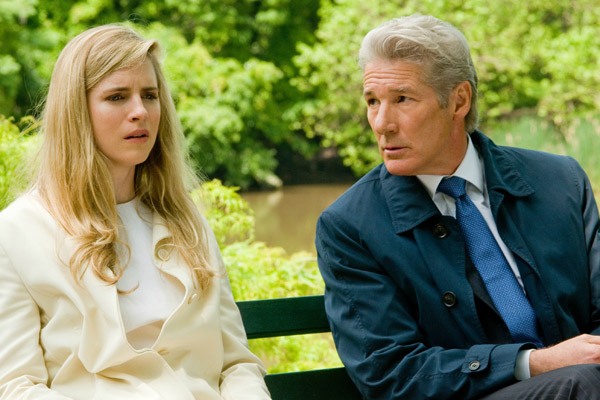[Originally published in GeneseeSun.com]
The rich are people too! Who knew?

Brit Marling and Richard Gere, “Arbitrage”
Movies with a Wall Street theme are fairly common, with examples running from the arguably serious Wall Street and The Bonfire of the Vanities to the “Prince-and-the-Pauper” themed comedy, Trading Places. There seems to be a recent flurry, however, with entries including last year’s somewhat mystifying Margin Call and, circulating in some theaters now, Arbitrage, the Nicholas Jarecki film starring Richard Gere.
The latter two films make an interesting contrast. Margin Call, released at the height of the Occupy protests, featured a solid ensemble cast headed by Kevin Spacey. It addressed the 2008 collapse of the global financial system by dramatizing a single night’s events in an investment banking firm on the eve of the crash’s public debut. The film was never clear about what actually happens financially, and seemed to be a fictional mash-up of two or three major notorious episodes, the main one being a little-known event in Paris in 2008 where one firm unloaded a boatload of bad assets on an unsuspecting market in an extraordinarily short time, attempting to be the first rat off the ship.
Margin Call resembled something like a horror flick, with a bunch of people staring at something that they never actually show you on screen and saying “Oh my God!” Seriously. Dozens of scenes show the main characters staring at a computer monitor in increasing degrees of shock and alarm, as the blood drains from their faces, without once showing you what’s on the monitor or explaining just what they’re so freaked out about. Whatever it is, we know it’s going to be big, and cost a lot of money, and probably bankrupt the company, and screw things up for a lot of other people too. After the film ended, the conversation with everyone I took to see it went exactly the same way: Q: “What was that about?” A: “I have absolutely no idea.”
In contrast, the high-finance part of Arbitrage is about a fairly straightforward and commonplace business jam, except with a whole lot of zeroes. The back story: Robert Miller (Gere) is a hedge-fund wizard who invested a major chunk of his company assets in a copper mine in Russia (hellooooo), which he apparently wasn’t supposed to do. The copper mine is lucrative, but the Russian government won’t let the profits out of the country. Disaster looms for Miller’s firm and its investors, and he first covers up the resulting $412 million hole in their balance sheet with fudged books (i.e. fraud), then by secretly borrowing the $412 million, short-term, from a buddy (!). The primary business plot that drives Miller through the course of the film is his attempt to close a quick deal, before the house of cards collapses, to sell the whole firm to an unsuspecting bank for $500 million, by which he can pay back the loan, ”nobody gets hurt,” and “we get to keep the house.” I’m not going to spoil the ending for you.
At the same time his professional life is in crisis, Miller’s personal life goes off the rails. His personal and his business lives turn out to be completely intertwined, though. An impromptu overnight escape with his high-maintenance mistress ends in a catastrophic car crash, in a way that could jeopardize the business deal he’s obsessed with closing. The crash itself is indirectly set up by the extreme stress he’s under; his unreasonably gorgeous daughter Brooke (Brit Marling, Another Earth) is an executive in his firm; his beautiful wife, Ellen (Susan Sarandon) suspects both the personal and the business problems and eventually takes steps to protect her interests; and scruffy police detective Michael Bryer, played quirkily by Tim Roth, turns decidedly zealous in his follow-up on the car crash, partly out of class resentment. I’m not going to spoil the ending of this plot for you, either.
The quite youthful Jarecki draws superb performances from his cast, including Gere, but the supporting performances are possibly even better. Sarandon’s is a pro performance in a smallish role, as is Roth’s surprisingly quirky turn as the detective. Nate Parker, as the youthful African-American son of Miller’s former driver, is a standout, and Stuart Margolin, who plays Miller’s personal lawyer, just drips with authenticity.
Jarecki manages the action and the complicated intertwined plotlines adroitly, with a moody, minimalist soundtrack by Cliff Martinez and perfect cinematography by the French filmmaker Yorick Le Saux. The film has the look and feel of a serious, stylish thriller, rather than … what? … a boring film about Wall Street.
The film is at its best, though, for its beautiful depiction of the lifestyles of the extremely wealthy, particularly the inhabitants of the financial industry. They seem to float through Manhattan and even the skies above with their every trivial need anticipated and met, assisted by chauffeurs and chefs, personal lawyers and assistants, and staff of all kinds, interacting only obliquely with lesser (i.e. ordinary) mortals, in want of nothing but at the same time wanting everything.